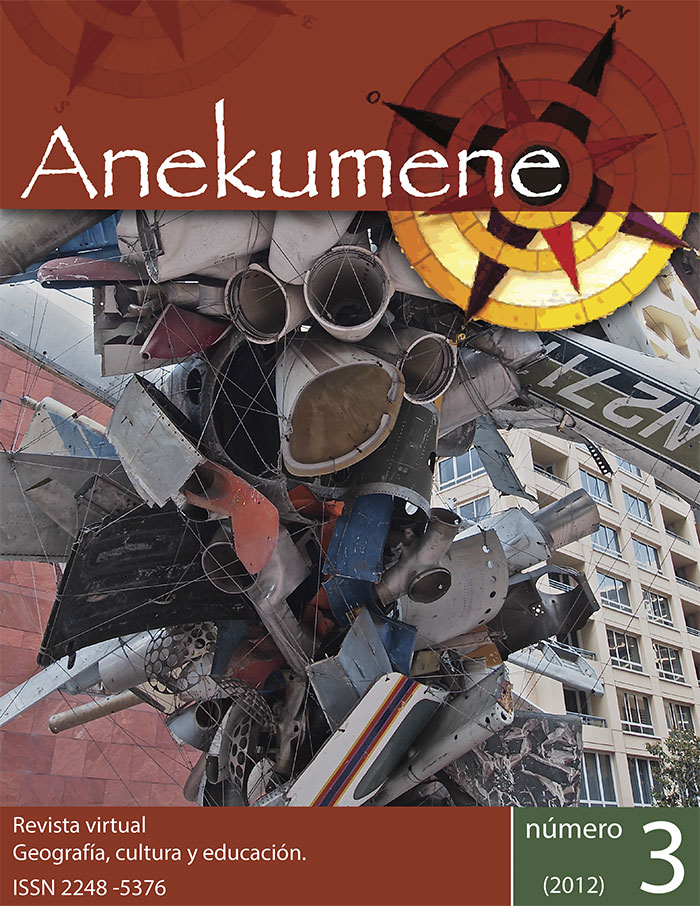Hacia un marco de investigación en educación geográfica
Resumen
La investigación es la piedra preciosa en la corona de la educación geográfica. Una investigación bien desarrollada y fidedigna provee información, hallazgos y entendimiento accesible para los profesionales mientras realizan sus tareas cotidianas. La educación geográfica recurre a la investigación sobre educación en términos de metodología y contribuye a la investigación sobre educación tanto en términos de contenido como de metodología. Investigar es una actividad intencionada y sistemática basada en comportamiento ético. No obstante la investigación en educación geográfica requiere de una cultura conducente a la investigación y a investigadores formados, sostenidos en un financiamiento adecuado para el desarrollo de proyectos, variados en escala y complejidad. Este artículo se basa en un marco de investigación en educación geográfica suficientemente general para posicionar los estudios recientes y actuales y permitir dibujar conexiones entre estudios específicos localizados en lugares particulares y los componentes de un marco que se encuentra representado en la figura Nº1.
Citas
Bednarz, S. (2000). Education research in the Journal of Geography 1988–1997. International Research in Geographical and Environmental Education, 9 (2), 128–141. DOI: https://doi.org/10.1080/10382040008667641
Bell, D. (2005). The value and importance of geography. Teaching Geography. 30 (1), 12–13.
Butt, G. (ed.) (2011). Geography, Education and the Future. London: Continuum.
Butt, G. (2010). Which methods are best suited to the production of high-quality research in geography education? International Research in Geographical and Environmental Education, 19(2), 103–107. DOI: https://doi.org/10.1080/10382046.2010.482189
Chan, E., Kwan, T. and Lidstone, J. (2012). Changing Conceptions of Teaching and Learning in Hong Kong: from Geography to Liberal Studies. Hong Kong: INSTEP, Faculty of Education, The University of Hong Kong.
Convey, A. and Nolzen, H. (eds.) (1997). Geographie und Erziehung. Munchen Studien zur Didaktik der Geographie. Munich: University of Munich.
Downs, R. M. (1994). The need for research in geography education: it would be nice to have some data. Journal of Geography, 93 (1), 57–60. DOI: https://doi.org/10.1080/00221349408979690
Downs, R. M., Liben L. S and Daggs, D. G. (1988). On education and geographers: the role of cognitive developmental theory in geographic education. Annals of the Association of American Geographers, 78 (4), 680–700. DOI: https://doi.org/10.1111/j.1467-8306.1988.tb00238.x
Foskett, N. and Marsden, B. (eds.) (1998). A Bibliography of Geographical Education 1970–1997. Sheffield: Geographical Association.
Foskett, N. and Marsden, B. (eds.) (1998). A Bibliography of Geographical Education 1970–1997. Sheffield: Geographical Association.
Gerber, R. (ed.) (2003). International Handbook on Geographical Education. Dordrecht: Springer. DOI: https://doi.org/10.1007/978-94-017-1942-1
Gerber, R. and Williams, M. (eds.) (1996). Qualitative Research in Geographical Education. Armidale: University of New England Press
Gerber, R. and Williams, M. (2000). Research and geography teaching: overview and international perspectives. In A. Kent (ed.) Reflective Practice in Geography Teaching, London: Paul Chapman/Sage.
Gerber, R. and Williams, M. (eds) (2002). Geography, Culture and Education. Dordrecht: Springer. DOI: https://doi.org/10.1007/978-94-017-1679-6
Gerber, R. and Williams, M. (2002). Geographical education and the challenge of lifelong learning. In R. Gerber, and M. Williams (eds.) Geography, Culture and Education. Dordrecht: Springer.
Haubrich, H, (ed.) (1987). International Trends in Geographical Education. Freiburg: Commission for Geographical Education of the International Geographical Union.
Henderson, K. and Tilbury, D. (2004). Whole-School Approaches to Sustainability: An International Review of Sustainable School Programmes. Report Prepared by the Australian Research Institute in Education for Sustainability (ARIES). Canberra: Department of the Environment and Heritage.
Hopkins, C. (2013). Education for sustainable development in formal education in Canada. In R. McKeown and V. Nolet (eds.) Schooling for Sustainable Development in Canada and the United States. Dordrecht: Springer.
Humphrys, G. and Williams, M. (eds.) (2005). Presenting and Representing Environments. Dordrecht: Springer. DOI: https://doi.org/10.1007/1-4020-3814-3
Johnson, L. C. (2008). Re-placing gender? Reflections on 15 years of Gender, Place and Culture Reubicando el género? Reflexiones sobre 15 años de Gender, Place and Culture. Gender, Place and Culture: A Journal of Feminist Geography 15 (6), 561-574. DOI: https://doi.org/10.1080/09663690802518412
Kidman, G. and Papadimitrou, F. (2012). Content analysis of international research in geographical and environmental education: 18 years of academic publishing. International Research in Geographical and Environmental Education, 21 (1), 3–10. DOI: https://doi.org/10.1080/10382046.2012.639152
Knowles, M. S. (1978 2nd. edn.) The Adult Learner: A Neglected Species. Houston: Gulf Publishing Company.
Lee, J. C-K and Williams, M. (eds.) (2006). Environmental and Geographical Education for Sustainability. NewYork: Nova Science Publishers, Inc.
Lee, J. C-K and Williams, M. (eds.) (2009). Schooling for Sustainable Development in Chinese Communities: Experience with Younger Children. Dordrecht: Springer.
Lee, J. C-K, Lam, W-P. and Williams, M.(2009). The Education for Sustainable Development Project in Hong Kong. In J. C-K. Lee and M. Williams, (eds.) Schooling for Sustainable Development in Chinese Communities: Experience with Younger Children. Dordrecht: Springer.
Le Grange, L. and Beets, P. (2005). Geography education in South Africa after a decade of democracy. Geography 90 (3), 267–277. DOI: https://doi.org/10.1080/00167487.2005.12094138
Lidstone, J. and Williams, M. (eds.) (2006). Geographical Education in a Changing World: Past Experiences, Current Trends and Future Challenges. Dordrecht: Springer. DOI: https://doi.org/10.1007/1-4020-4807-6
Lidstone, J. and Williams, M. (2006). Researching change and changing research in geographical education. In J. Lidstone and M. Williams (eds.) Geographical Education in a Changing DOI: https://doi.org/10.1007/1-4020-4807-6_1
World: Past Experiences, Current Trends and Future Challenges. Dordrecht: Springer.
Lukehurst, C. T. and Graves, N. (eds.) (1972). Geography in Education: A Bibliography of British Sources 1870–1970. Sheffield: Geographical Association.
Maude, A. (2009). Re-centring geography: a school-based perspective on the nature of the discipline. Geographical Research 47 (4), 368–379. DOI: https://doi.org/10.1111/j.1745-5871.2009.00589.x
McKeown, R. and Nolet, V. (eds.) (2013). Schooling for Sustainable Development in Canada and the United States. Dordrecht: Springer. DOI: https://doi.org/10.1007/978-94-007-4273-4
Ofsted (2004). Ofsted Subject Reports 2002/03: Geography in Primary Schools. London: HMSO.
Ofsted (2008). Geography in Schools: Changing Practice. London: HMSO.
Ofsted (2011). Geography: Learning to make a world of difference. London: HMSO.
Papadimitrou, F. and Kidman, G. (2012). Statistical and scientometric analysis of international research in geographical and environmental education. International Research in Geographical and Environmental Education, 21 (1), 11–20. DOI: https://doi.org/10.1080/10382046.2012.639153
Powell, J.M. (1984). Curriculum reform and the ‘constituency’ challenge: recent trends in school geography. Australian Geographical Studies 22 (2), 275–285. DOI: https://doi.org/10.1111/j.1467-8470.1984.tb00634.x
Roberts, M. (2011). Conclusion. In G. Butt (ed.) Geography, Education and the Future. London: Continuum.
Rutherford, D. (2002). Building empirically-based theory in geography education. International Research in Geographical and Environmental Education, 11 (3), 283–286. DOI: https://doi.org/10.1080/10382040208667493
Shin-Cooper, J. (2012). Has geography education research grown in the past decade? A typology review of research in the Journal of Geography, 2000-2010. http://geography.uoregon.edu/edge/EDGE/Projects/2012/J_Shin_Cooper_2012.pdf. Accessed Oct. 4th 2012.
Soares, M. L. de A. and Petarnella, L. (eds.) (2011). Schooling for Sustainable Development in South America. Dordrecht: Springer. DOI: https://doi.org/10.1007/978-94-007-1754-1
Soares, M. L. de A., Petarnella, L. and Garcia, E. de C. (eds.) (2011). Education for sustainable development: experience with students of early childhood education in the State School Paulo
Tapajós, São Paulo/Brazil. In M. L. de A. Soares, and L Petarnella (eds.) Schooling for Sustainable Development in South America. Dordrecht: Springer.
Tilbury, D. (2011). Education for Sustainable Development: An Expert Review of Processes and Learning. Paris: UNESCO.
Williams, M. (ed.) (1996). Understanding Geographical and Environmental Education: the Role of Research, London: Cassell.
Williams, M. (1997). Research in geographical education: retrospect and prospect. Geographie und ihre Didaktik, 3 (26), 124–135.
Williams, M. (1999). Research in geographical education. International Research in Geographical and Environmental Education, 8 (3), 301–304. DOI: https://doi.org/10.1080/10382049908667623
Williams, M. (2003). Research in geographical education: the search for impact. In R. Gerber (ed.) International Handbook on Geographical Education. Dordrecht: Springer.
Williams, M. (2005). Environmental education and lifelong learning: awareness to action. In G. Humphrys and M. Williams (eds.) Presenting and Representing Environments. Dordrecht: Springer.
Williams, M. and Humphrys, G. (eds.) (2003). Citizenship Education and Lifelong Learning: Power and Place. New York: Nova Science Publishers, Inc.
Williams, P. (2012). Education for sustainability in New Zealand; success through Enviroschools. In M. Robertson (ed.) Schooling for Sustainable Development: A Focus on Australia, New Zealand and the Oceanic Region. Dordrecht: Springer.
Descargas
Derechos de autor 2018 Anekumene

Esta obra está bajo una licencia internacional Creative Commons Atribución-NoComercial 4.0.




